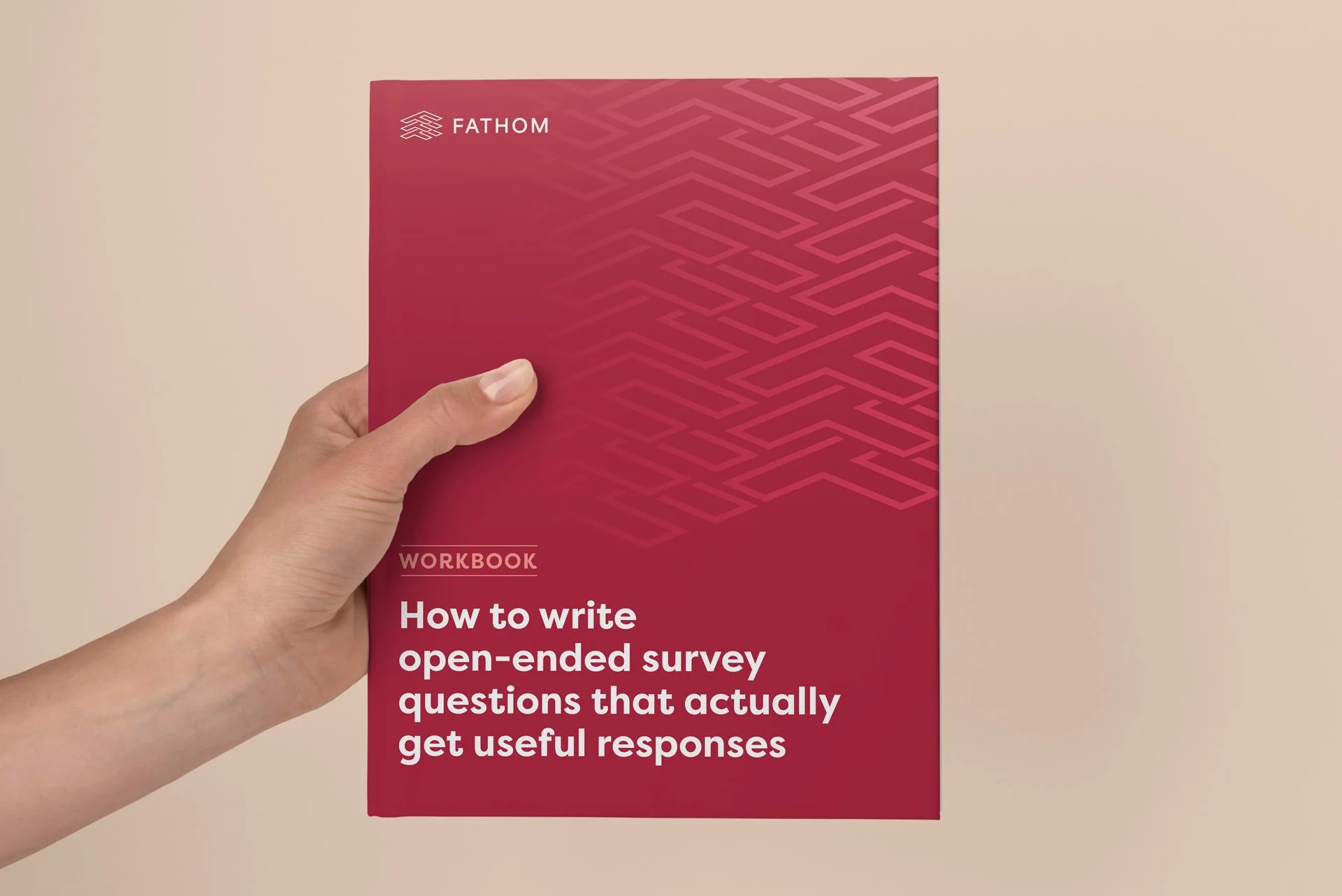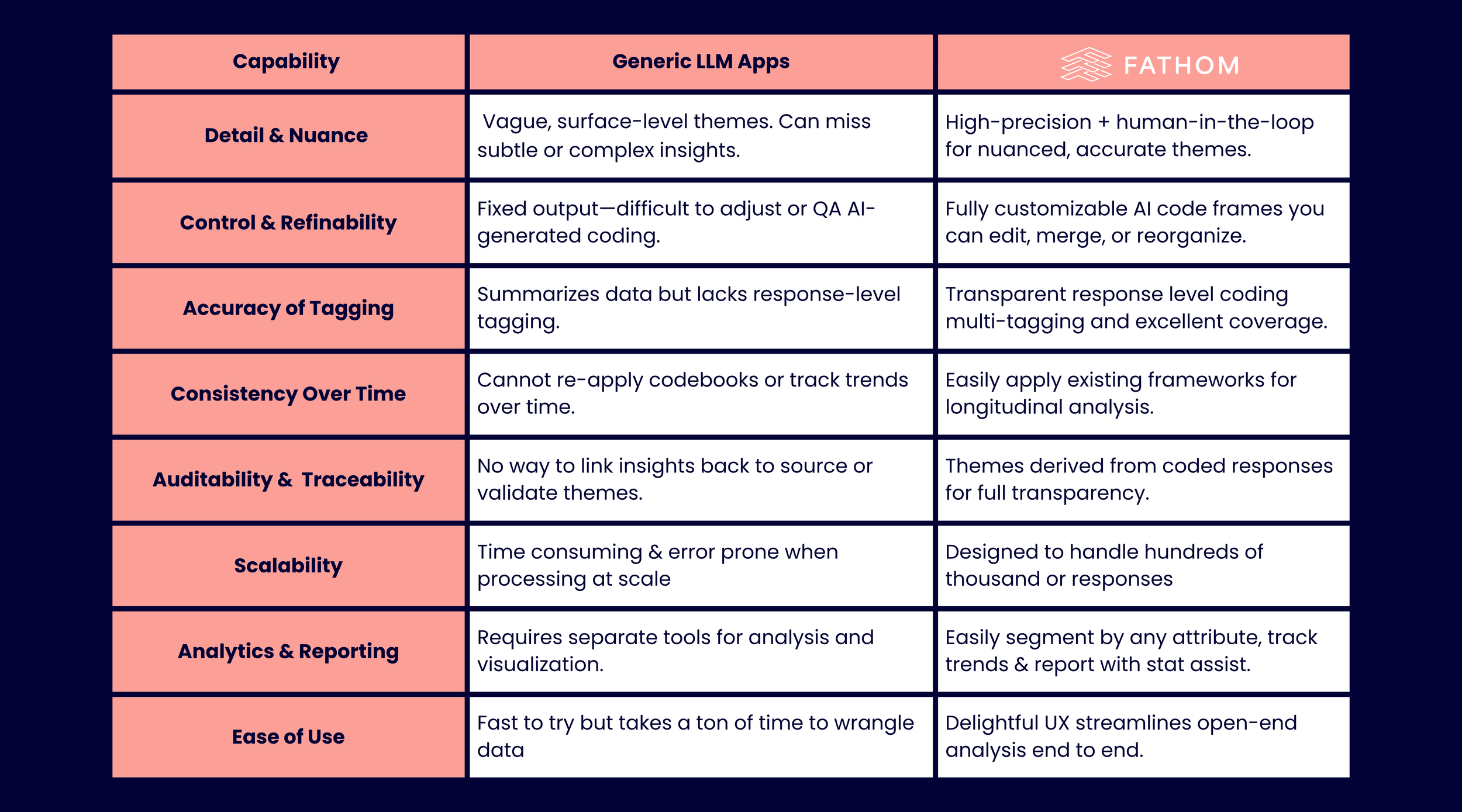When to Use Fathom and When to Use ChatGPT for Thematic Analysis
When are generic AI summaries are good enough & when does a purpose-built text analytics solution like Fathom unlock real value.
Is ChatGPT Good Enough for Analyzing Open-Ended Survey Data?
ChatGPT and other general-purpose LLMs are often the first stop when teams start experimenting with open-ended analysis. And that’s fair. For a quick summary or brainstorm, they’re fast and surprisingly capable.
But analyzing open-ended survey data isn’t just about summarizing. It’s about extracting and analyzing nuanced insight with the precision and accuracy needed to deliver trusted insight.
So, when is a general-purpose LLM like ChatGPT “good enough”? And when do you need a purpose-built platform like Fathom?
For low-stakes, occasional sense-making, you can use ChatGPT or CoPilot to Analyze Open Ends
Tools like ChatGPT and Copilot can be surprisingly helpful for quick-turn, low-stakes tasks when it comes to open-ended analysis. You might use them to:
Occasionally summarize a small batch of verbatims
Draft a starter code frame to kick off sense making
Surface themes from raw responses when you’re okay with a large margin of error
For exploratory thinking or lightweight analysis with small data sets, these tools can save time and help you get your bearings. But if you're delivering insights to clients or internal teams, or working with any level of open ended data at scale, you'll quickly hit limitations.
For Professional Grade Research, Fathom Delivers High-Quality, Scalable, Open Ended Survey Analysis
When your open-ended analysis requires that you can control the code frame, accurately tag all responses, analyze coded data with confidence, or maintain excellence in security and privacy - and do any of this efficiently at scale, it’s time to consider a purpose-built thematic coding and verbatim analysis tool.
Fathom was purpose-built for open-ended survey analysis, especially in high-volume, high-stakes contexts like market research, customer experience, public opinion and product feedback.
With Fathom’s thematic coding you get:
Human-in-the-loop AI that combines speed with oversight and control
Customizable code frames you can build, refine, and reuse
Transparent, response-level coding with multi-tagging for coverage and detail
Interactive analytics to explore trends by segment, surface sentiment, and track themes over time
Streamlined workflow from import to analysis to insight to export or reporting
Enterprise-grade compliance including SOC 2
LLM Apps and Fathom: What’s Different?
The Risks of ChatGPT for Open-Ended Coding and Why Fathom Wins
Large language models like ChatGPT can be helpful for quick scans or informal idea generation, but they fall short when it comes to the depth, consistency, and transparency that professional-grade thematic analysis demands. Fathom is purpose-built for open-ended data at scale — combining powerful AI with human-in-the-loop quality control, flexible code frames, clear audit trails, and robust analytics. Where general LLMs help spark early thinking, Fathom delivers the rigor, customization, and governance researchers need to unlock precise, defensible insights that drive action.
1. Detail & Nuance: Capture Subtle Themes in Open-Ended Feedback
Generic LLMs produce high-level summaries, but flatten subtle signals that makes qualitative data so valuable. Fathom excels in nuance and detail, so you capture the specific context that’s key to your data.
Fathom’s Difference: Fathom pairs AI with expert human oversight to reveal the nuance behind each comment so you catch what generic AI misses.
What this means for you: Instead of vague trends, uncover the specific drivers that fuel business metrics like customer loyalty or churn.
2. Control & Refinability: Fully Customizable Code Frame
Fathom’s Difference: Fathom lets you start with AI suggestions, then refine, merge, or reorganize themes to fit your goals perfectly.
With generic AI, you’re stuck with ‘take it or leave it’ outputs that are hard to adjust. Fathom is a human-in-the loop process that empowers you to leverage AI while staying in control of your code frame.
What this means for you: You stay in control of how open-ended responses are coded, no more wrestling with rigid AI output.
3. Accuracy of Tagging: Response-Level, Multi-Tag Coding
ChatGPT doesn't tag each response, so cross-tabs and segments aren’t possible. Without response level tagging, it’s impossible to verify the accuracy of summaries. It’s also important to segment and perform advanced statistical tests on the coded data. With Fathom, responses are coded to themes unlocking a world of rigouros analytics.
Fathom’s Difference: Every response is accurately tagged enabling analysis of distributions, comparisons between segments, and statistical confidence.
What this means for you: you can break down feedback by audience, sentiment, or theme, and trust that nothing is missed.
4. Consistency Over Time: Track Trends Reliably
Generic LLM prompts aren’t repeatable, run the same prompt twice, get different answers. Fathom makes it possible to hold a consistent code frame across data sets.
Fathom’s Difference: Fathom makes it easy to apply a consistent code frame for longitudinal waves of data.
What this means for you: You can track trends over time reliably, and identify shifts in sentiment or themes.
5. Auditability & Traceability: Verbatim-Level Transparency
Generic LLMs act like black boxes. You can’t trace a theme back to the source comments. Fathom’s interactive interface empowers you to seamlessly move between themes and the raw responses tagged to those themes.
Fathom’s Difference: Every insight in Fathom is fully traceable back to real verbatims.
What this means for you: When stakeholders push back, you can show exactly who said what no guesswork, no reputational risk.
6. Scalability: Analyze Thousands of Responses Without the Bottleneck
Generic LLMs interfaces choke on big datasets, meaning hours of manual work and frustration. Fathom is built for scale, making it easy to ingest data as often as you’d like, by as many team members as you’d like, and to analyze data sets of any size.
Fathom’s Difference: Fathom was purpose-built to analyze open-ended responses at scale.
What this means for you: You spend less time wrangling data, and more time in the strategic work that matters.
8. Ease of Use & Collaboration: Built for Real Research Workflows
Prompt tools are for solo exploration, not structured team analysis. With Fathom, you’re set up with the enterprise grade DIY platform you need to support your entire research team and workflow, and the most excellent customer support you could imagine.
Fathom’s Difference: Fathom supports user roles, collaborative workflows, & export-ready outputs (SPSS!)
What this means for you: Empowered teams, informed stakeholders and streamlined insights.
So When Is It Time to Upgrade your Thematic Coding?
Tools like ChatGPT or Copilot can be handy for quick, low-stakes gist from open-ended data. They're great for a a rough summary for your own eyes, or exploring a handful of responses.
But if you’re nodding along with any of these, it’s probably time to move beyond generic AI:
☑️ You’re analyzing hundreds, thousands or millions of open-ended responses and ad hoc prompts just don’t scale.
☑️ You need detailed, and specific themes reflecting your data, context and research needs.
☑️ You want to compare segments, geographies or attributes — with statistical confidence and advanced analytics
☑️ You’re managing multiple projects, trackers, or longitudinal studies that need consistent coding over time.
☑️ You need to control or refine your code frame to reflect your context and needs, ‘good enough” isn’t good enough.
☑️ Your insights are client-facing or directly inform high-stakes business decisions so vague summaries aren’t good enough.
☑️ You’re spending more than an hour working with ChatGPT just to get something usable
☑️ You care about auditability, data security, and trust and need clear traceability back to verbatims.
Why Choose Fathom Over ChatGPT for Thematic Analysis
ChatGPT and similar LLMs are great for quick, informal open-ended data exploration but lack the precision, control, and scalability needed for professional thematic analysis. Fathom’s platform pairs advanced AI with human oversight, customizable coding, transparent tagging, and powerful analytics to deliver accurate, actionable insights at scale. While ChatGPT is useful for early brainstorming, Fathom is ideal for high-stakes, high-volume analysis requiring rigor and control.
👉 For quick drafts and early exploration, ChatGPT can be a handy tool in your kit.
👉 For professional-grade, rigorous, repeatable insights at scale - give Fathom a Whirl with a Free Trial
Download the Resources
You Might Also Be Interested In
-

ChatGPT for Text Analytics: Why It Might Not Be Your Best Choice
ARTICLE
General Purpose LLMs are prone to hallucinations, so the summaries they provide are prone to errors. And if you ask ChatGPT to summarize your responses 5 different times, you will get 5 different summaries.
-

Crafting Open-Ended Survey Questions
WORKBOOK
Getting actionable insights from open-ended data starts by asking good questions. Learn how to craft questions that produce results by avoiding 5 common pitfalls.
-

How Agencies Use Text Analytics for Innovation and Efficiency
WEBINAR
Stream this jam-packed webinar for agencies, focused on how high quality text analytics can help you win new business, improve team dynamics, and drive financial growth!



